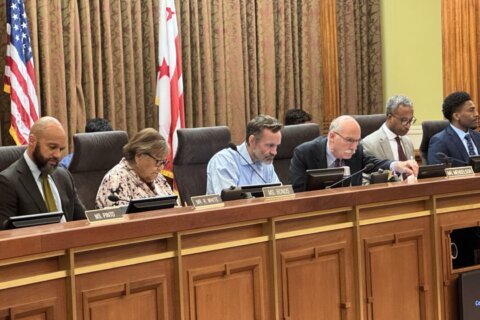The outlook for the upcoming winter holiday shopping season is “grim,” according to an expert at The George Washington University School of Business.
“I don’t think this is going to be a joyous, bountiful, relaxing, happy, holiday season,” said Donna Hoffman, the Louis Rosenfeld Distinguished Scholar and professor of Marketing at the D.C. university.
Summing up what she expects, Hoffman said, “One word, four letters: G-R-I-M.”
Last year’s holiday season saw an uptick in what was described as “revenge travel,” as well as people interested in experiences and goods. But Hoffman thinks the current mood is to return back to basics.
“I think there are a lot of clouds on the horizon, thunderstorm clouds,” Hoffman said.
She characterizes as “bleak” the recent release of the consumer price index.
“People are worried about (the cost of) gas and eggs and milk and bread and food. I don’t think we’re going to see a lot of discretionary purchases,” Hoffman said.
Hoffman said people have become painfully aware of supply chain issues affecting everything from baby formula to computer chips. That, she said, is driving early shopping and pressure to get holiday shopping done.
“Because if it’s in the store, on the shelf now, it might not be there in a week or in a month,” she said. “I think we’re also seeing the holiday shopping is going to be a lot more fundamental, not as fun and frivolous, perhaps and maybe focused more on basics.”
Hoffman said she believes the financial concerns transcend income levels.
“I think that there are very few segments in the population who are not worried about what’s happening,” Hoffman said.
“Because if you are in a middle class or an upper middle class segment, you’ve got to be hurting from the stock market. And you’ve got to be worried about, for example, if you’re close to retirement. ‘Maybe I can’t retire; maybe I need to wait because my 401(k) has taken a hit.’ I think this quarter, this Q4 right now in the United States is impacting almost everybody; and I think it’s going to be very difficult.”
There’s concern about inflation not being tamed, Kiplinger reported. There may be more interest rate increases from the Federal Reserve, CNET reported. Rumblings overseas are growing about new immune-evasive coronavirus variants, Fortune reported.
“The voices are getting louder that the variant, a new variant or variants are coming; and they’re going to be coming by November,” Hoffman said.
Mitigation strategies, such as masking, have relaxed and very few people are getting the new bivalent COVID-19 vaccine booster shots, the latest Centers for Disease Control and Prevention numbers indicated.
COVID-19 numbers may begin to rise as cold weather drives people indoors; Hoffman said she believes that being inside, in part, will drive consumers to shop online.
Online shopping could also be fueled by deep discounts from retailers trying to clear shelves filled with overstocked products — from when people had cash from pandemic support — to make room for new items.
“I think we’re going to see a lot of deals,” Hoffman predicted. “But, I think we’re also going to see a lot of stuff that people don’t really want because they’re worried now about, ‘Can I put gas in the tank? Can I buy some bread and milk and eggs?’”








